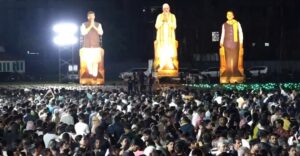Feeding Pigeons in Mumbai Now a Punishable Offense: Bombay High Court Cites Health Risks, Authorizes FIRs

Feeding Pigeons in Mumbai Now a Punishable Offense: Bombay High Court Cites Health Risks, Authorizes FIRs
Feeding pigeons in Mumbai—a practice long associated with tradition and religious sentiment—is now officially deemed a punishable offense. The Bombay High Court has ruled that encouraging large gatherings of pigeons by feeding them constitutes a public nuisance and a serious health hazard, directing the Brihanmumbai Municipal Corporation (BMC) to take firm action against violators, including filing FIRs.
The ruling was delivered by a bench of Justices G.S. Kulkarni and Arif Doctor during a hearing on a petition filed by animal welfare activists Pallavi Patil, Sneha Visaria, and Savita Mahajan. The petitioners had challenged the BMC’s demolition of designated pigeon feeding areas, or ‘kabutarkhanas’, which began on July 3. They argued that the demolitions violated the Prevention of Cruelty to Animals Act.
Although the Court earlier paused the demolition, recognizing the historical value of kabutarkhanas, it had clearly prohibited pigeon feeding from continuing at those sites. Despite this, reports emerged that people were still feeding pigeons at several locations—and even obstructing municipal workers from enforcing the court’s directives.
Expressing serious concern, the Court stated:
“What we are witnessing is outright defiance of the law. Individuals are continuing to feed pigeons despite our clear orders, and in some cases, are interfering with civic staff trying to do their job.”
The judges authorized the BMC to initiate legal proceedings against anyone violating the no-feeding order.
“Feeding pigeons under these circumstances constitutes a public nuisance and poses a grave threat to human health,” the Court said.
The decision focuses not just on legalities but on the broader public health implications. Pigeon droppings and densely packed flocks at feeding sites have been linked to respiratory and airborne diseases—putting nearby residents, especially the elderly and those with respiratory issues, at heightened risk.
The Court emphasized:
“This is not merely a matter of tradition or animal welfare—it is a public safety issue. The unchecked congregation of pigeons contributes to unsanitary conditions and increases the risk of disease transmission.”
In light of this, the BMC has been instructed to take all necessary steps to deter public pigeon feeding and control pigeon population gatherings across Mumbai. This includes enforcement measures at all known kabutarkhana locations.
The judges concluded that while respecting cultural practices is important, public health must come first:
“When tradition endangers the well-being of citizens, it must be regulated. Preventing disease and safeguarding lives are paramount.”
The petitioners’ concerns about animal rights were acknowledged, but the Court maintained that ensuring the health and safety of the public justifies strong and immediate regulatory action.










